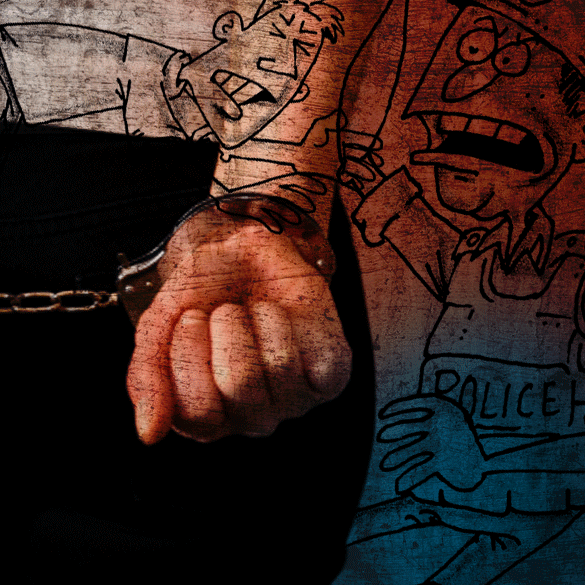“The Fourth Amendment was designed to stand between us and arbitrary governmental authority. For all practical purposes, that shield has been shattered, leaving our liberty and personal integrity subject to the whim of every cop on the beat, trooper on the highway and jail official. The framers would be appalled.”—Herman Schwartz, The Nation
~
If you want a recipe for disaster, take police officers hyped up on their own authority and the power of the badge, throw in a few court rulings suggesting that security takes precedence over individual rights, set it against a backdrop of endless wars and militarized law enforcement, and then add to the mix a populace distracted by entertainment, out of touch with the workings of their government, and more inclined to let a few sorry souls suffer injustice than to challenge the status quo.
The resulting concoction, I can promise you, will be a messy, noxious stew unfit for consumption, miserable to digest and with after-effects that will leave you reeling and clutching your stomach in dismay. Such is the nature of life in the emerging police state that is America today, where roadside police stops have devolved into government-sanctioned exercises in humiliation and degradation with a complete disregard for privacy and human dignity.
Consider, for example, what happened to 38-year-old Angel Dobbs and her 24-year-old niece, Ashley, who were pulled over by a Texas state trooper on July 13, 2012, allegedly for flicking cigarette butts out of the car window. First, the trooper berated the women for littering on the highway. Then, insisting that he smelled marijuana, he proceeded to interrogate them and search the car. Despite the fact that both women denied smoking or possessing any marijuana, the police officer then called in a female trooper, who carried out a roadside cavity search, sticking her fingers into the older woman’s anus and vagina, then performing the same procedure on the younger woman, wearing the same pair of gloves. No marijuana was found.
Leila Tarantino was allegedly subjected to two roadside strip searches in plain view of passing traffic during a routine traffic stop, while her two children—ages 1 and 4—waited inside her car. During the second strip search, presumably in an effort to ferret out drugs, a female officer “forcibly removed” a tampon from Tarantino’s body. No contraband or anything illegal was found.
Meanwhile, four Milwaukee police officers have been charged with carrying out rectal searches of suspects on the street and in police district stations over the course of several years. One of the officers is accused of conducting searches of men’s anal and scrotal areas, often inserting his fingers into their rectums and leaving some of his victims with bleeding rectums. Half-way across the country, the city of Oakland, California, has agreed to pay $4.6 million to 39 men who had their pants pulled down by police on city streets between 2002 and 2009.
And then there’s the increasingly popular practice of doing blood draws at DUI checkpoints, where drivers who refuse a breathalyzer test find themselves subjected to forcible blood extractions to test for alcohol levels. Police in Tangipahoa Parish, Louisiana, actually had a registered nurse and an assistant district attorney on hand “to help streamline the ‘blood draw’ warrants and collect blood samples from suspected impaired drivers” at one exercise in holiday drunk driving enforcement. A similar case, Missouri v. McNeely, which deals with a driver who failed a sobriety test, then refused a breathalyzer test and was subjected to a warrantless blood draw, is currently before the U.S. Supreme Court.
Of course, the issue being debated in McNeely is not so much whether the government can forcibly take your blood but whether it can do so without a warrant. As important as the Fourth Amendment’s warrant requirement may be, it’s scant comfort in the face of a societal acceptance of roadside stops where blood is being drawn and cavity searches are being carried out.
No matter which way the Supreme Court rules in Missouri v. McNeely, it will do little to rein in this runaway police state of ours. Indeed, as we have seen repeatedly, by the time a case arrives before the U.S. Supreme Court, it’s almost too late for any real change to take place, especially when it’s a matter of government abuse. More often than not, during the course of however many years it takes for a case to make its way through the courts, the particular violations being challenged have already been accepted by the citizenry as part of the government’s modus operandi.
Such was the case with Florence v. Bd. of Chosen Freeholders of County of Burlington,which attempted to challenge the practice of forcible strip searches by government officials, namely jail wardens. Albert Florence, an African-American man in his mid-thirties, was on his way to Sunday dinner in 2005 when his then-pregnant wife, who was driving, was pulled over by a New Jersey State Police trooper. Asked to show his ID, Florence soon found himself handcuffed, erroneously arrested for failing to pay a traffic fine, and forced to submit to two egregious strip and visual body-cavity searches at two different county jails. After spending six days in jail, Florence was finally able to prove his innocence. Outraged, Florence sued the jail officials who had needlessly degraded his bodily integrity.
It took seven years for Florence’s case to make it to the Supreme Court, and a year later, in April 2012, the Court handed down a 5-4 ruling which struck a blow to any long-standing protections against blanket strip searches, declaring that any person who is arrested and processed at a jail house, regardless of the severity of his or her offense (i.e., they can be guilty of nothing more than a minor traffic offense), can be subjected to a strip search by police or jail officials without reasonable suspicion that the arrestee is carrying a weapon or contraband.
However, all the while Florence was making its way through the courts, law enforcement officials were playing fast and loose with the Fourth Amendment’s prohibition on searches and seizures, especially as it relates to violations of bodily integrity and roadside strip searches. Examples of minor infractions which have resulted in strip searches include: individuals arrested for driving with a noisy muffler, driving with an inoperable headlight, failing to use a turn signal, riding a bicycle without an audible bell, making an improper left turn, engaging in an antiwar demonstration (the individual searched was a nun, a Sister of Divine Providence for 50 years). Police have also carried out strip searches for passing a bad check, dog leash violations, filing a false police report, failing to produce a driver’s license after making an illegal left turn, having outstanding parking tickets, and public intoxication. A failure to pay child support could also result in a strip search.
This brings us to the present moment where we find ourselves hapless, helpless passengers in a runaway car hurtling down the road toward a police state, and the only hope of salvation rests with the Supreme Court, which is little hope at all when you consider that the Court has, in recent years alone, given a green light to all manner of police abuses, including the tasering of a pregnant woman for failing to sign a speeding ticket.
It must be remembered that the Fourth Amendment to the U.S. Constitution was intended to protect the citizenry from being subjected to “unreasonable searches and seizures” by government agents. While the literal purpose of the amendment is to protect our property and our bodies from unwarranted government intrusion, the moral intention behind it is to protect our human dignity. Unfortunately, the rights supposedly guaranteed by the Fourth Amendment have been steadily eroded over the past few decades. Court rulings justifying invasive strip searches as well as Americans’ continued deference to the dictates of achieving total security have left us literally stranded on the side of the road, grasping for dignity.



